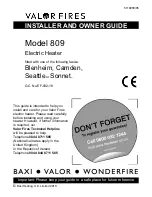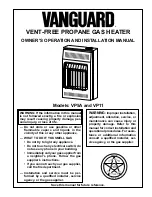
35
LEAkAGE ChECkPoInts
INSTrUCTIoNS: USE ThIS ILLUSTrATIoN AS A GUIdE whEN ChECkING For SoUrCES oF wATEr LEAkAGE.
All water which appears at the heater bottom or on the
surrounding floor may be caused by condensation, loose
connections or relief valve operation and leakage. Do not
replace the heater until a full inspection of all potential leak
points is made and corrective steps taken to stop the leak.
Leakage from other appliances, water lines, or ground seepage
should also be suspected until proved otherwise.
Where possible, remove or lift top cover to
examine threads of fittings installed into tank
for evidence of leakage. Correct fitting leaks
as necessary.
Relief valve operation and leakage may be
due to water expansion during heating cycle
or foreign material on seat of valve. If the valve
is not piped to an open drain, the released
water could be mistaken for a leaking heater.
To check where threaded portion enters tank,
insert Q-Tip® or similar absorbent material
between jacket opening and valve to swab
spud area. Remove valve* if leak is indicated
and repair with pipe joint compound.
Water on the side of the tank may be
condensation due to the panel or insulation
not being in place.
Water leaks at the elements may be due to:
1. Defective elements which leak at terminals
or through flange. Replace element*.
2. Loose element/gasket leak:
Tighten element with element wrench.
If leak continues, remove element* and
discard gasket. Clean gasket seating
areas and reinstall element with new
gasket.
Condensation and dripping may appear on
pipes when inlet water temperature is low.
Pipe fitting may be leaking.
Drain valve leakage could be from the valve itself. Either
correct the problem or replace the valve*. To check for
leakage where threaded portion enters tank, insert Q-tip
or similar absorbent material between jacket opening
and valve to swab spud area. Remove valve* if leak is
indicated and repair with pipe joint compound.
* Contact a Qualified Service Agency as it is necessary to
shut off electricity and drain tank to perform procedure.
Summary of Contents for HC 119 Series 100
Page 7: ...7 FEATURES AND COMPONENTS ELECTRONIC CONTROL MODELS Figure 2 ...
Page 8: ...8 FEATURES AND COMPONENTS SURFACE MOUNT CONTROL MODELS Figure 3 ...
Page 49: ...49 NOTES ...
Page 50: ...50 NOTES ...
Page 51: ...51 NOTES ...
















































